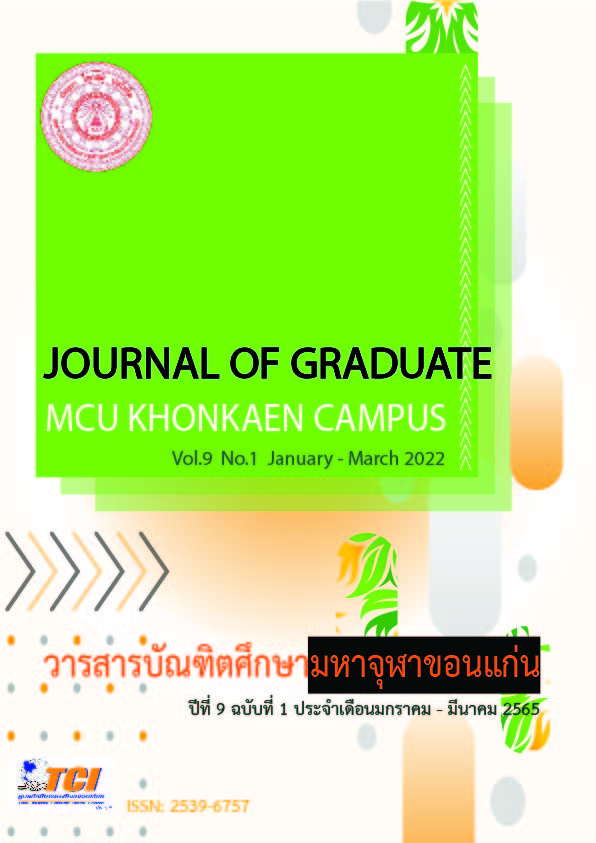การพัฒนาหลักสูตรฝึกอบรมสำหรับเสริมสร้างความรู้ ทักษะการปฏิบัติงาน และทักษะการสื่อสารภาษาอังกฤษสำหรับพนักงานแคดดี้
Main Article Content
บทคัดย่อ
การวิจัยครั้งนี้มีวัตถุประสงค์เพื่อ 1) พัฒนาหลักสูตรฝึกอบรมสำหรับเสริมสร้างความรู้ ทักษะ
การปฏิบัติงาน และทักษะการสื่อสารภาษาอังกฤษสำหรับพนักงานแคดดี้ให้มีประสิทธิภาพตามเกณฑ์มาตรฐาน 80/80 2) เปรียบเทียบความรู้ ทักษะการปฏิบัติงาน และทักษะการสื่อสารภาษาอังกฤษของ
ผู้เข้าฝึกอบรมก่อนและหลังการฝึกอบรม และ 3) ประเมินความพึงพอใจของผู้เข้าฝึกอบรมที่มีต่อหลักสูตรกลุ่มตัวอย่างที่ใช้ในการวิจัย คือ ผู้เข้าฝึกอบรม จำนวน 44 คน ได้มาจากการสุ่มตัวอย่างอย่างง่าย กำหนดขนาดตัวอย่างโดยตารางสำเร็จรูปของเครจซี่และมอร์แกน เครื่องมือที่ใช้ในการวิจัย ได้แก่ 1) หลักสูตร
ฝึกอบรมสำหรับเสริมสร้างทักษะการปฏิบัติงาน และทักษะการสื่อสารภาษาอังกฤษสำหรับพนักงานแคดดี้
2) แบบทดสอบความรู้ ทักษะการปฏิบัติงาน และทักษะการสื่อสารภาษาอังกฤษ และ 3) แบบประเมินความพึงพอใจที่มีต่อหลักสูตรฝึกอบรม สถิติที่ใช้ในการวิเคราะห์ข้อมูล ได้แก่ การหาค่าประสิทธิภาพ (E1/E2) ค่าเฉลี่ย ค่าส่วนเบี่ยงเบนมาตรฐาน และการทดสอบค่าที กรณีกลุ่มตัวอย่างไม่เป็นอิสระต่อกัน
ผลวิจัยพบว่า 1) หลักสูตรฝึกอบรม มีค่าประสิทธิภาพเท่ากับ 80.16/80.72 ซึ่งเป็นไปตามเกณฑ์ที่ตั้งไว้ 80/80 2) ความรู้ ทักษะการปฏิบัติงาน และทักษะการสื่อสารภาษาอังกฤษของผู้เข้าฝึกอบรม
หลังการฝึกอบรมสูงกว่าก่อนการฝึกอบรม อย่างมีนัยสำคัญทางสถิติที่ระดับ .05 และ 3) ความพึงพอใจ
ที่มีต่อหลักสูตรอยู่ในระดับมาก
Article Details

อนุญาตภายใต้เงื่อนไข Creative Commons Attribution-NonCommercial-NoDerivatives 4.0 International License.
เอกสารอ้างอิง
กองทุนเพื่อความเสมอภาคทางการศึกษา (2562). ความเป็นมา หน้าที่ และอำนาจ. สืบค้นเมื่อ 15 มีนาคม 2563, จาก https://www.eef.or.th/about/
เกียรติศักดิ์ สังข์ด้วง สุเมธ งามกนก และ สมพงษ์ ปั้นหุ่น. (2560). การพัฒนาหลักสูตรฝึกอบรมเสริม
สร้างศักยภาพครูในการส่งเสริมอาชีพของนักเรียนและชุมชน โดยใช้โรงเรียนเป็นฐานในการ
พัฒนาท้องถิ่น. วารสารวิชาการมหาวิทยาลัยราชภัฏภูเก็ต, 13(1), 321-342.
จงกลนี ชุติมาเทวินทร์. (2558). การฝึกอบรมเชิงพัฒนา. (พิมพ์ครั้งที่ 2). กรุงเทพฯ: สำนักพิมพ์
จุฬาลงกรณ์มหาวิทยาลัย.
ชัยยงค์ พรหมวงศ์. (2556). การทดสอบประสิทธิภาพสื่อหรือชุดการสอน. วารสารศิลปากรศึกษาศาสตร์ วิจัย, 5(1), 7-20.
ชัยวัฒน์ สุทธิรัตน์. (2561). 80 นวัตกรรมการจัดการเรียนรู้ที่เน้นผู้เรียนเป็นสำคัญ. (พิมพ์ครั้งที่ 8).
นนทบุรี: พี บาลานซ์ไซด์แอนปริ้นติ้ง.
ชูชัย สมิทธิไกร. (2558). การฝึกอบรมบุคลากรในองค์กร. (พิมพ์ครั้งที่ 9). กรุงเทพฯ: สำนักพิมพ์แห่ง
จุฬาลงกรณ์มหาวิทยาลัย.
ทิศนา แขมมณี. (2560). ศาสตร์การสอน : องค์ความรู้เพื่อการจัดกระบวนการเรียนรู้ที่มีประสิทธิภาพ.
(พิมพ์ครั้งที่ 21). กรุงเทพฯ: สำนักพิมพ์แห่งจุฬาลงกรณ์มหาวิทยาลัย.
นันทวรรณ แก้วโชติ, ธัชทฤต เทียมธรรม และ พิทักษ์ เผือกมี. (2562). การพัฒนาหลักสูตรฝึกอบรม
การออกแบบการจัดการเรียนรู้ การวัดและประเมิน ผลการเรียนรู้วิชาคณิตศาสตร์ที่สอดคล้อง
กับมาตรฐาน และตัวชี้วัดเพื่อพัฒนาผู้เรียนสู่ยุคประเทศไทย 4.0. วารสารวิชาการ มหาวิทยาลัย กรุงเทพธนบุรี, 8(1), 73-85.
ปรียาพร วงศ์อนุตรโรจน์. (2553). จิตวิทยาการบริหารงานบุคคล. กรุงเทพฯ: บริษัท พิมพ์ดี จำกัด.
พนิดา พุฒเขียว พิมพ์พิมล นนท์เสนา และชเนตตี พิมพ์สวรรค์. (2560). การพัฒนาหลักสูตรอบรม
ออนไลน์โดยใช้เทคโนโลยีวิดีโอสตรีมมิ่งมีเดีย. วารสารแม่โจ้เทคโนโลยีสารสนเทศและนวัตกรรม มหาวิทยาลัยแม่โจ้, 3(2), 41-53.
พระมหาภานุวัตน์ ลุใจคา และ ปริญญภาษ สีทอง. (2563). การพัฒนาหลักสูตรเตรียมความพร้อม
เพื่อเป็นพระธรรมทูตสา หรับสามเณร. วารสารวิทยาลัยสงฆ์นครลำปาง, 9(1), 9-20.
วิภา ตัณฑุลพงษ์. (2560). การพัฒนาหลักสูตรฝึกอบรมสำหรับเสริมสร้างความสามารถในการสอนเขียน เชิงสร้างสรรค์และทักษะการผลิตผลงานการเขียน สำหรับครูในสังกัดสำนักงานคณะกรรมการ
การศึกษาขั้นพื้นฐาน. วารสารสุทธิปริทัศน์, 31(99), 54-66.
สิริอร วิชชาวุธ. (2554). จิตวิทยาการเรียนรู้. กรุงเทพมหานคร: สำนักพิมพ์มหาวิทยาลัยธรรมศาสตร์.
เสาวภา ปัญจอริยะกุล. (2561). รายงานวิจัยการพัฒนาหลักสูตรฝึกอบรม เรื่อง การวิจัยปฏิบัติการใน
ชั้นเรียนเพื่อยกระดับผลสัมฤทธิ์ทางการเรียน. มหาวิทยาลัยราชภัฏเชียงใหม่.
Art-in, S. (2014). The development of teacher training curriculum on learning management
to develop students’ analytical thinking. Thailand Procedia - Social and Behavioral
Sciences, 116(2014), 939-945.
Best, J.W. (1997). Research in education. (8thed.). New Jersey: Prentice – Hell, lnc.
Burry-Stock, J.A., Shaw, D.G., Laurie, C., and Chissom, B.S.. (1996).“ Rater Agreement
Indexes for Performance Assessment”. Educational and Psychological Measurement
Journal, 56(2), 251-262.
Creswell J.W. and Plano Clark V.L. (2011). Designing and conducting mixed methods research.
(2nd ed.). Los Angeles: Sage Publications.
Druzhinina, M., Belkova, N., Donchenko, E., Liu, F. and Morozova, O. (2018). Curriculum
design in professional education: Theory and practice. Retrieved on 25 July 2020
from https://www.shs-onferences.org/articles/shsconf/pdf/2018/11/ shsconf_
cildiah2018_01046.pdf.
Johnson, C. (2007). Creating learning environments for Thai learners. Bangkok:
S. Charuenkarnpim Ltd.
Karen, S. M., Julie C. L., Tamara, S. L., Erin, B., Nick H., Kathy E. and Saranee, D. (2014).
The role of research in online curriculum development: The case of earth labs
climate change and earth system modules. Journal of Geoscience Education,
(4), 560–577.
Krejcie, R.V. and Morgan, D.W. (1970). Educational and psychological measurment. New
York: Minnisota University.
Steven, A. B., Susan, J. B., and Diana K. I. (2013). Communication: Principles for a lifetime.
(5th ed.). Boston: Allyn & Bacon.
Taba, H. (1962). Curriculum development theory and practice. New York: Harcourt Brace
and World.

